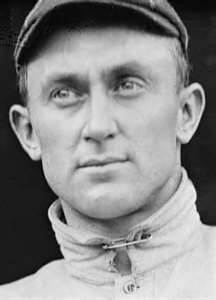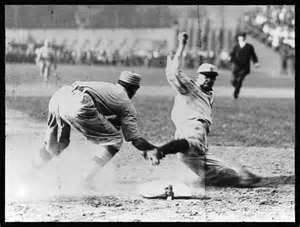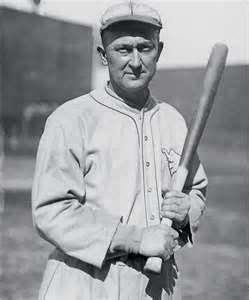Ty Cobb: Baseball's Fiercest Spirit
Ty Cobb, a star in the early part of the 20th Century, was one of baseball's greatest players. A fierce competitor, he was tremendously talented and at one time held dozens of Major League Baseball records. His parents named him Tyrus when he was born in 1886 in the rural Georgia community of The Narrows, which wasn't an official city at the time. He began swinging a baseball bat very early in life and declared his ambition to play professionally, in contradiction to his parents' hopes for an academic career. A family tragedy left him at 18 without a father. When he was a teen, he joined a couple of semi-professional teams, including the Anniston Steelers, who paid him $50 a month. As a semi-pro player, he came to the attention of legendary sportswriter Grantland Rice, who gave Cobb his nickname, "the Georgia Peach."
He found success the following season, when he hit .316. He proved a speedy center fielder but was too fast at times, recording more errors than other players of his ability. In 1907, the Tigers moved Cobb to right field and he elevated his game at the plate considerably. He won the American League batting title that year (at the time, the youngest ever, at age 20), finishing with a .350 batting average and a league-high 212 hits and 119 runs batted in. He also recorded 49 stolen bases. It was the first of three straight American League championships for the Tigers, who advanced to the World Series each of those three years but lost each time, twice to the Chicago Cubs and once to the Pittsburgh Pirates. Cobb had his best offensive year in 1911, finishing first in the American League in every offensive category except home runs. He hit .420, with 248 hits, 147 runs scored, 47 doubles, 24 triples, and 127 RBI. He also stole 83 bases. He was understandably voted AL Most Valuable Player.
He had a good eye for pitches to hit as well, compiling a lifetime batting average of .367, still the highest ever. He had a 40-game hitting streak in 1911 and a 35-game hitting streak in 1917. In 1921, he got his 3,000th hit, at age 34 still the youngest player to reach that milestone. He enlisted in the U.S. Army near the end of World War I and served in France for several weeks before being discharged. He returned to the Tigers and resumed his career. He became the Tigers' manager in 1921 and served in that capacity, while still playing, for six years. He spent his last two years with the Philadelphia Athletics, retiring after the 1928 season.
He was in the first class of players to be elected to the National Baseball Hall of Fame, in 1936, along with Babe Ruth, Walter Johnson, Christy Mathewson, and Honus Wagner. His name was on 222 of the 226 ballots cast; at 98.2 percent, this was the highest percentage of any player (even Ruth) until 1992. Ty Cobb died in 1961. His estate was estimated at nearly $12 million, which today would be $91 million. He is remembered for his intensity on the field and his desire to win in any way he could, through speed and cunning and determination. He still ranks in the top five in nearly every offensive category. |
|
Social Studies for Kids
copyright 2002–2026
David White



 Cobb played his first Major League game on August 30, 1905, as a member of the Detroit Tigers. In his first at-bat, he doubled off New York Highlanders pitcher Jack Chesbro, who had won 41 games the previous season. Cobb wasn't a spectacular player that year, but he played well enough to convince the Tigers to keep him on the roster.
Cobb played his first Major League game on August 30, 1905, as a member of the Detroit Tigers. In his first at-bat, he doubled off New York Highlanders pitcher Jack Chesbro, who had won 41 games the previous season. Cobb wasn't a spectacular player that year, but he played well enough to convince the Tigers to keep him on the roster. He continued to lead the Tigers in most offensive categories, and his speed and intensity came to be well-known around the Major Leagues. He excelled at the stolen base, recording a sky-high total of 96 in 1915. (That single-season record stood for decades.) Five times, he reached first base and then stole second, third, and then home in succession. (Once, so the story goes, he did this even after telling the catcher that he was going to do so.)
He continued to lead the Tigers in most offensive categories, and his speed and intensity came to be well-known around the Major Leagues. He excelled at the stolen base, recording a sky-high total of 96 in 1915. (That single-season record stood for decades.) Five times, he reached first base and then stole second, third, and then home in succession. (Once, so the story goes, he did this even after telling the catcher that he was going to do so.) Off the field, Cobb was a family man and a shrewd businessman. He married twice, in 1908 and 1949, and had five children. He also invested his money in two prominent companies, General Motors and Coca-Cola. He was a celebrity spokesman for Coke and eventually owned 20,000 shares of stock and three bottling plants.
Off the field, Cobb was a family man and a shrewd businessman. He married twice, in 1908 and 1949, and had five children. He also invested his money in two prominent companies, General Motors and Coca-Cola. He was a celebrity spokesman for Coke and eventually owned 20,000 shares of stock and three bottling plants.
